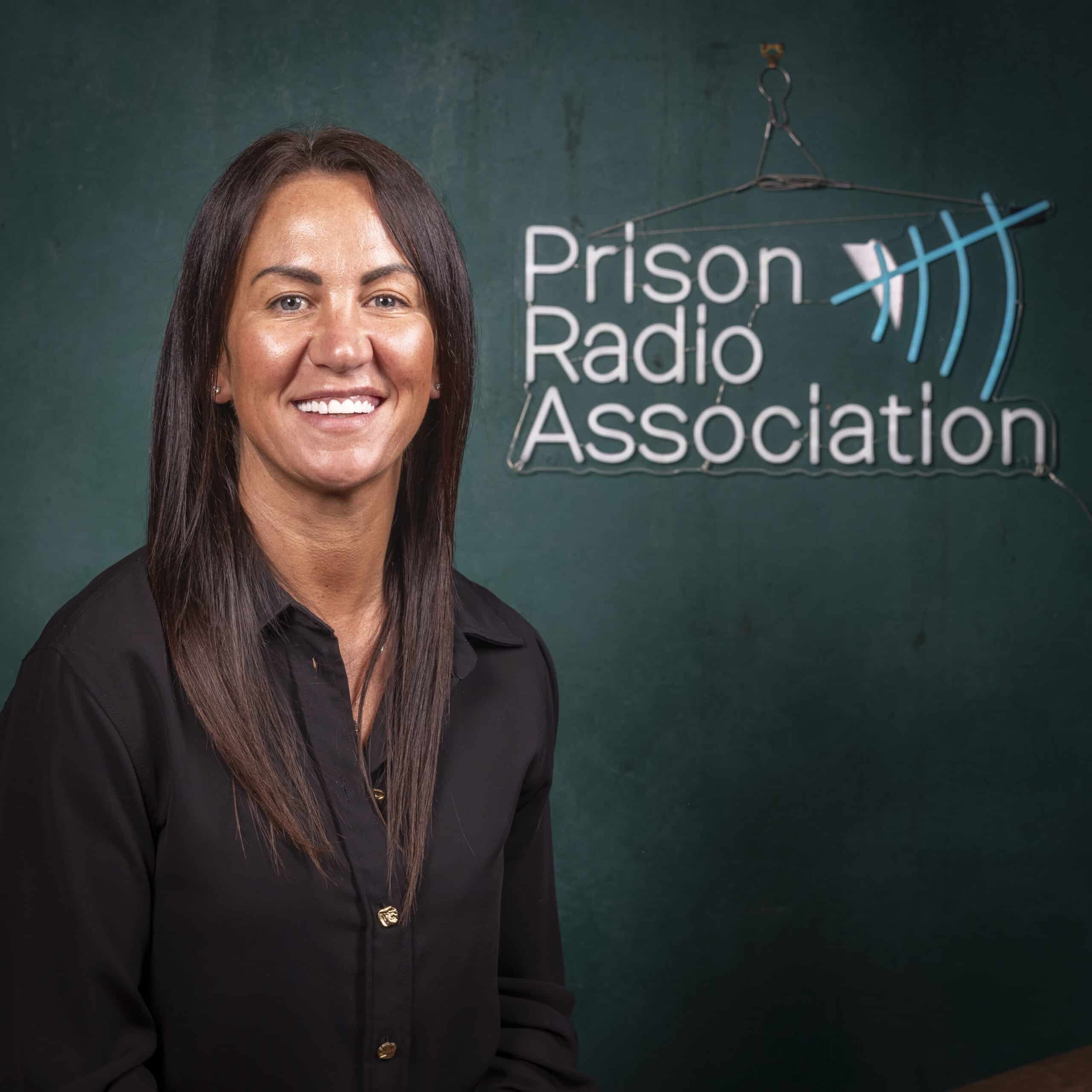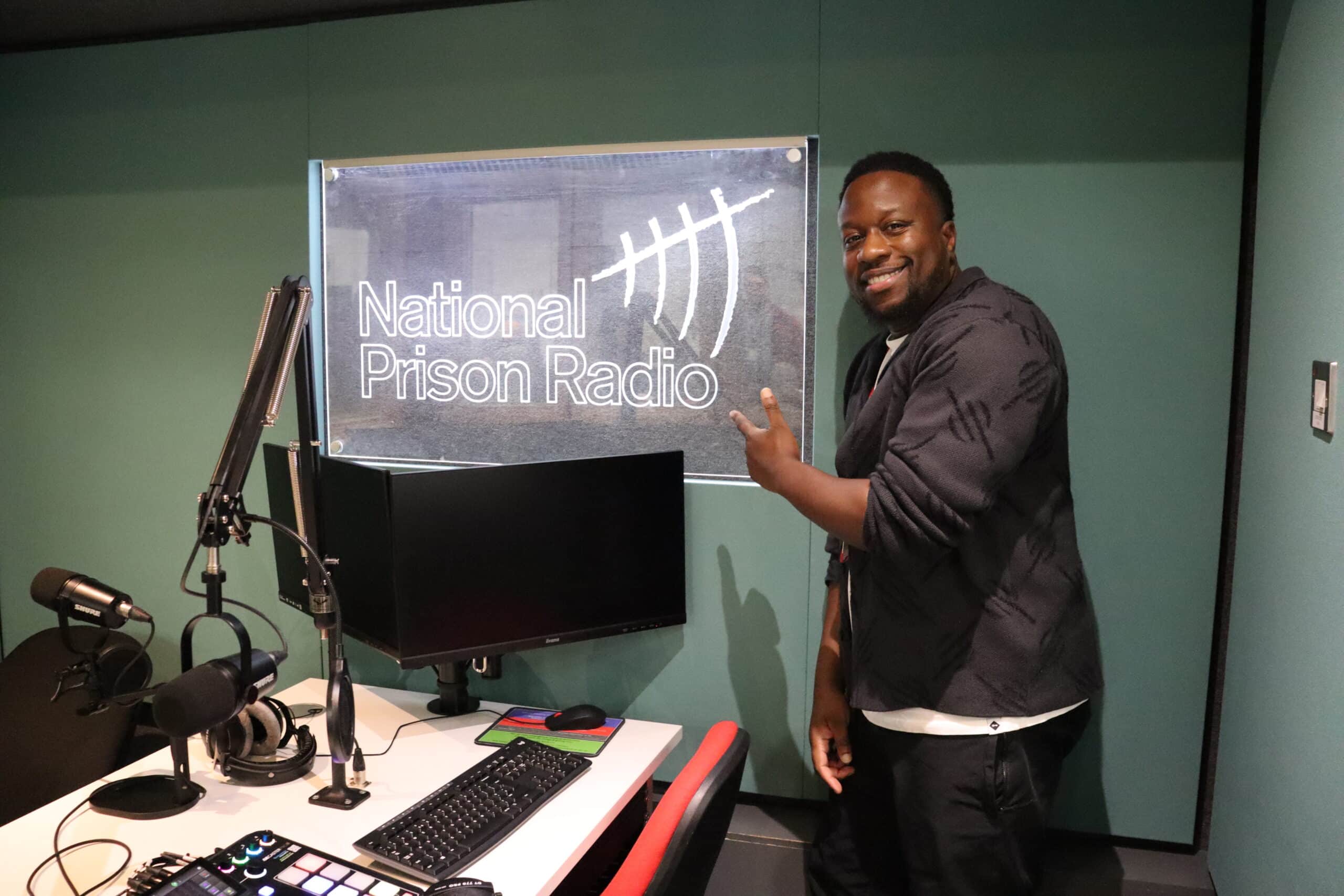Latest News

Tweet us@PrisonRadioUK

Actor, Comedian and Writer Babatunde Aleshe took a visit to our studio at HMP Brixton to be interviewed by our National Prison Radio team on anxiety, counselling and the importance of friendship.
Babatunde is known to the world for taking the stage under the bright lights of the Apollo, competing amongst other celebrities in the jungle on I’m A Celebrity Get Me Out Of Here and chilling with fellow comedian Mo Gilligan on his Gogglebox sofa, but our National Prison Radio team got to learn a little more about the challenges Babatunde has faced over the span of his career and learn what advice he has for listeners inside prison who struggle with anxiety.
Babatunde told National Prison Radio presenter ‘A’ how he first started comedy age 17 but was inspired as early as 8 years old after watching a VHS of comedian Eddie Murphy’s ‘Delirious’ stand-up comedy television special. From then on he was always trying to be the class clown and make his friends laugh. When he attended college he thought to himself, ‘I want to be a Comedian’ – it was a classmate who told him, “instead of saying it, go do it!”, and so he did.
When ‘A’ asked him what he would tell his 15 year old self, Babatunde reassured himself: “Be patient, it’s going to happen. Your dreams will come true… work hard, work harder than you’ve ever worked before, when you’re thinking you’re working hard, work even harder, go even better.”
And what advice would he give our listeners out there who have aspirations? “It doesn’t matter what age you are at in terms of when you want to pursue your dream, so long as you have a dream. The more you fail, the more you learn what works and what doesn’t work… some people are not comfortable with failure, you have to embrace that.”

However one thing has got in the way of his career in the past: anxiety. Babatunde told ‘A’ that when he had experienced it in the past, he never considered it to be a mental health issue; he was brought up thinking that mental health symptoms were always ‘severe’ and always resulted in people being placed in institutions. He didn’t know that anxiety could be treated.
It’s reported that 7 in 10 women and nearly 5 in 10 men in prison have mental health issues. Babatunde gave advice to those in prison who may be experiencing issues and told ‘A’ that he now deals with his anxiety through investing in himself:
“I go to therapy, I definitely do that. And that’s something I recommend to everybody. It’s not what you think it is. A lot of people think, oh, that person’s in therapy, they’re dealing with like something deep. And it’s just like, nah, not all the time, you know? And it’s not that you’re sitting in a room and you’re balling your eyes out. Sometimes it can be that way, but sometimes it’s not. And the outcome is not what I thought it was. I thought I’d be like coming out of the therapy session, like, man, like I really got to unpack this and go deep within myself. [But] I feel empowered. I come out with a skip in my step and I go home proper happy and because it’s like I’ve let all of this stuff off my chest and I’ve spoken about things in depth and that’s, it’s empowering. So I recommend therapy.”
One of Babatunde’s closest friends is fellow Comedian Mo Gilligan who he appears with on the celebrity version of Gogglebox and who he has gone on tour with. Mo has expressed how important the power of laughter is for people. ‘A’ explained to Babatunde how much of a big thing it is for people in prison going through turmoil. Babatunde told ‘A’ he’s only realised now he’s in the position he’s in how important laughter is for people:
“I’ve had several people message me on social media telling me about me just making them laugh and what that’s done for them. I had a lady, I’m on my way to therapy, right? She stops me in her car and she was like, oh my God, are you Babatunde? And she was just like, I’m so sorry to do this, but I don’t think you understand what you’ve done for me and my family. She was telling me about her father who was in hospital and going through it, obviously she was scared about losing him and stuff like that. And she was just like, you’ve cheered me up in these past few days that I’ve been going through this. She said, I’ve just been watching your content and you’ve cheered me up so much, to the point where she was just like, I cannot believe like, I’m seeing you right now… I invited her to my church and everything. She came to my church and yeah, it was mind blowing. And then she phoned my management, told him that she had just seen me on road and I gave her words of encouragement. I didn’t tell her to do none of that. You know what I’m saying?
So whenever I get that feedback, I’m just like, yo, this is crazy. Like all I’m doing is just trying to make you laugh and I don’t want nothing in return – I just want to make you guys laugh. That’s it. You know what I’m saying? And so when you’ve receive the feedback, it’s amazing.”

And on the topic of friendship, ‘A’ talked to Babatunde about how thanking your friends and your community for being there for you is an important part of life, especially for those in prison who need that support during their sentence. Babatunde acknowledged what his friends and his community have done for him throughout his life and asked for our listeners to do the same: “You have to thank the people that are around you, the people that don’t give up on you, the people that, regardless whether you’re broke or whether you’re rich, whatever, they see you the same way and they treat you the exact same.”
‘A’ concluded the interview by asking Babatunde what his advice, words and inspiration would be for those inside prison today: “Hold your head up, forgive yourself, and find someone to really, really speak to, do some therapy, I think it’s so important.”
Babatunde’s interview will broadcast on NPR Talk throughout the week of the 3rd-10th February.
If you would like to stay up to speed with what’s going on at the Prison Radio Association subscribe to our monthly newsletter here or follow us on:
X – @prisonradiouk
Instagram – @prisonradiouk
TikTok – @prisonradiouk
Facebook – Prison Radio Association
LinkedIn – Prison Radio Association
National Prison Radio is the world’s first national radio station for people in prison. It’s available 24 hours a day, 365 days a year on in-cell TV.
NPR Talk is our talk show helping listeners find their future. The show focuses on issues in prison and features news, interviews and banter. NPR Talk broadcasts every weekday at 12:00 and 18:00 on National Prison Radio and reaches over 80,000 people behind bars across England and Wales.
National Prison Radio was founded by the Prison Radio Association – a registered charity. Shows like NPR Talk help people to cope with life inside prison and thrive on release. If you would like to support our work, and enhance the futures of people in prison across the UK you can make a donation at prison.radio/donate.